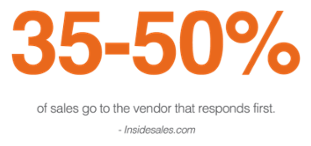50% of sales go to the vendor that responds first. Is your sales team’s average response time faster than your competition?
Imagine for a moment you’re entering an electronics retailer, ready to purchase a new television. You’ve been thinking about buying a new TV for a while, so you’ve done your homework. You know the difference between LCD and plasma. You’re certain that a 50 inch flat screen would look stellar hanging on the wall in your living room. Today’s the day. As you approach the salesman and begin to tell him the specifics of what you are looking to purchase, he looks at you and says, “Thanks for contacting me. I’ll be in touch within 24 to 48 hours.” It sounds silly, right? But that’s essentially what your company is telling prospects when it fails to respond quickly to online leads.
So how is “quickly” defined? Harvard Business Review (HBR) set out to measure how long on average it took for companies to respond to a web-generated lead. Auditing more than 2,200 businesses, they found an average first response time of 42 hours for businesses that responded to a lead within 30 days. Surprisingly, 23% of companies never responded. 
42 hours sure sounds like a long response time, but is it really? Turns out, it’s worse than you might think.
After reviewing the results of the HBR study, a research team at InsideSales.com examined three years of data across six companies that generate and response to web leads, from over fifteen thousand leads and over one hundred thousand call attempts. They focused on one question for this study: When should companies call web-generated leads for optimal contact and qualification ratios? Of this study a researcher wrote:
“…the odds of making a successful contact with a lead are 100 times greater when a contact attempt occurs within 5 minutes, compared to 30 minutes after the lead was submitted. Similarly, the odds of the lead entering the sales process, or becoming qualified, are 21 times greater when contacted within 5 minutes versus 30 minutes after the lead was submitted.”
Essentially, sales teams aren’t only missing opportunities to contact leads when they wait to respond, they’re also missing opportunities to qualify leads.
So where does the organizational problem lie? It could be that your sales team is hyper-focused on their own sales leads, ignoring signs from online leads that they’re nearing closer to purchase. It’s also possible there’s inherit incongruence in the distribution of online leads to members of your sales team. Could you improve response time if leads were distributed differently? Also culpable could be the frequency with which your sales team checks for new leads. Is your CRM pushing sales lead notifications to your sales team only once per day? Pushing out immediate notifications could positively affect your lead response time. Whatever the reason you identify, it’s important to address and rectify these issues as soon as possible.
With a white paper authored by Google and the Corporate Executive Board reporting that today’s B2B customers are nearly 60% through the sales process before engaging a sales rep, it is unsurprising that a reported 35% to 50% of sales go to the vendor that responds first. Is your sales team’s average response time faster than your competition?





Add Comment